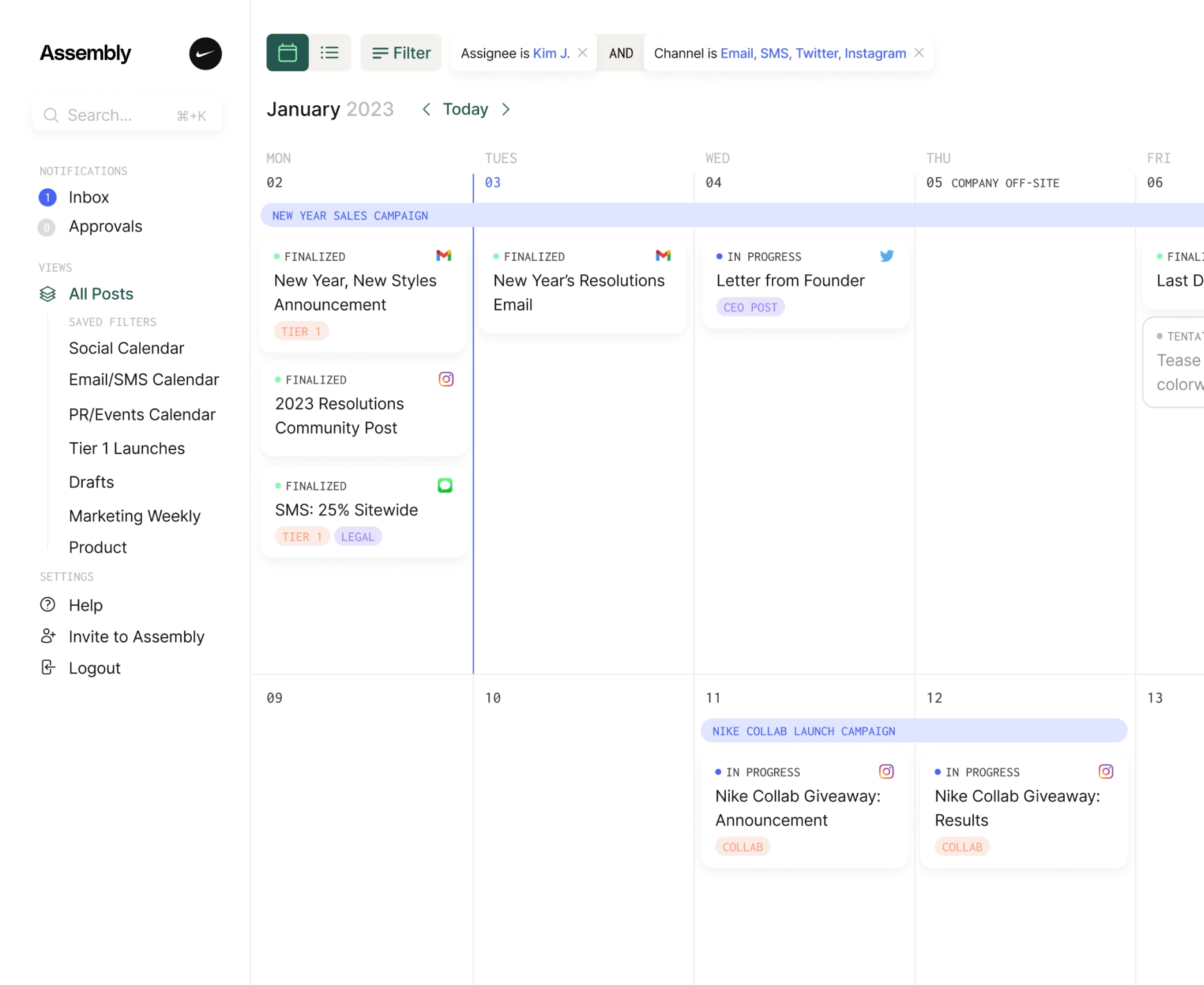
7 Oktopost Alternatives for 2024

Introduction
In the ever-evolving world of social media, having the right tools is crucial for businesses aiming to stay ahead of the curve
While Oktopost has been a popular choice for many, it's not always the perfect fit for every organization's needs. Whether you're seeking a more modern interface, better pricing, or specific features, here are 7 Oktopost alternatives worth considering.
1. Assembly
Assembly is an innovative social media management tool that stands out with its modern and sleek user interface. Designed for teams that value collaboration, Assembly offers a Notion-like editor, integrated approvals, and a comprehensive content calendar to streamline your social media workflow.
Pros of Assembly
Assembly excels when it comes to team and collaboration features. It’s a great alternative for B2B teams and agencies looking to switch from Oktopost.
- Cross-Platform Tagging: Easily tag both companies and users across all major social channels.
- Wide Range of Channel Support: Schedule posts on LinkedIn, Twitter, Threads, Instagram, Facebook, TikTok, and YouTube Shorts.
- Employee Advocacy Programs: Connect multiple accounts to manage posting for employee advocacy initiatives.
- Auto-Engagement Tools: Boost content performance with auto-likes, reposts, and comments.
- One-Click Crossposting: Simplify content distribution across multiple platforms.
- Social Media Analytics: Access detailed insights to inform your social media strategy.
- Affordable Pricing: Plans start at $50/month with a free 14-day trial. All plans come with unlimited users.
Exceptional Support
One of the highlights of Assembly aside from it’s rich feature-set is it’s customer support. On many plans, Assembly offers real-time chat as well as a shared Slack channel with it’s founders to escalate any feature requests or feedback.
Why Choose Assembly?
If you're seeking a tool that combines modern design with powerful features, Assembly is a top contender. Its collaborative environment is perfect for teams, and the wide range of supported channels makes it a versatile choice as an Oktopost alternative. Plus, the affordable pricing makes it accessible for businesses of all sizes.
2. Sprout Social
Sprout Social is a veteran in the social media management space, offering tools for scheduling, analytics, and social listening. It's designed to help businesses manage their social presence effectively.
Pros of Sprout Social
- Comprehensive Features: Offers scheduling, analytics, social listening, and more.
- Trusted Platform: An established player with a solid reputation.
- Advanced Analytics: In-depth reports to track performance and ROI.
Cons of Sprout Social
- High Cost: Plans start at $199 per user per month, which can be steep for small businesses.
- Dated Interface: The user experience may feel less intuitive compared to newer platforms.
- Learning Curve: The extensive features can make it challenging to navigate initially.
- Delayed Feature Updates: Sometimes slow to adopt the latest features from social platforms.
Considerations
For businesses that require a robust tool and have the budget for it, Sprout Social provides an all-in-one solution. However, for most businesses, Sprout is expensive and doesn’t scale well as you add more users. It’s UI can also be frustrating to use and has a steep learning curve.
3. Buffer
Buffer is known for its simplicity as a lightweight social media scheduler, making it a good choice for individuals just getting started with scheduling content that don’t need many other features.
Pros of Buffer
- Easy to Use: Intuitive design that's perfect for beginners.
- Great for Instagram: Particularly strong in scheduling and posting to Instagram.
Cons of Buffer
- Limited Features: Lacks advanced functionalities found in other tools.
- Team Collaboration: Minimal features for team workflows and approvals.
- Basic Planning Tools: Limited capabilities for drafting and planning content beyond scheduling.
- Outdated UI: Buffer’s UI can be difficult to adapt and are focused more around an individual user’s use case, rather than a team.
Considerations
If you're looking for a no-frills scheduler that's easy to use, Buffer is a solid option. It's best suited for individuals that don't require advanced features. As a result, Buffer is not recommended for teams looking for a social media platform.
4. Sprinklr
Sprinklr is designed for large enterprises, offering a wide array of features that go beyond standard social publishing.
Pros of Sprinklr
- Enterprise-Level Features: Includes crisis management, competitive analysis, and market research.
- Suitable for Fortune 500 Companies: Tailored for large-scale operations.
Cons of Sprinklr
- Expensive: Starts at $249 per user per month.
- Complexity: Requires training to use effectively due to its vast feature set.
- Overwhelming Features: Contains many features that may not be necessary, without the option to customize.
Considerations
Sprinklr might be overkill for small to medium businesses. Its high cost and complexity make it less accessible, whereas other alternatives like Assembly provides essential features in a more user-friendly package.
5. Hootsuite
Hootsuite offers basic social media management tools but has fallen behind in offering comprehensive features compared to newer platforms.
Pros of Hootsuite
- Content Calendar: Helps visualize scheduling.
- Core Analytics: Tracks basic metrics.
- Engagement Tools: Offers lightweight interaction features.
Cons of Hootsuite
- Feature Limitations: Incomplete support for LinkedIn and Twitter.
- Pricing vs. Value: Higher cost doesn't justify the limited features, especially for SMBs and agencies.
Considerations
Hootsuite has been a player in the space for a long time. While Hootsuite provides all the foundational tools, businesses looking for more advanced features at a reasonable price should look elsewhere.
6. EveryoneSocial
EveryoneSocial focuses on employee advocacy but may fall short in usability and cost-effectiveness.
Pros of EveryoneSocial
- Auto-Scheduling: Supports major social channels.
- Employee Advocacy: Includes programs to boost internal engagement.
- Service Level Agreement: Claims a 99% uptime.
Cons of EveryoneSocial
- Expensive: Pricing is high and only available upon request.
- No Free Trial: Limits the ability to test the platform before committing.
- User Experience: Reported as clunky and difficult to navigate.
Considerations
EveryoneSocial is a good alternative to Oktopost due to it’s employee advocacy program and SLA. However, the absence of a free trial limits the opportunity for businesses to test the platform's capabilities before making a commitment. Additionally, some users have reported that the product can be difficult to use and feels clunky, which may impact user adoption and efficiency within your team.
7. Zoho Social
Zoho Social is part of the larger Zoho ecosystem, which can be beneficial for users already invested in their suite of products.
Pros of Zoho Social
- AI Assistant: Includes the Zia AI assistant for insights.
- CRM Integration: Seamless connection with Zoho's CRM.
Cons of Zoho Social
- Slow Feature Releases: Not always up-to-date with the latest social media changes.
- API Issues: Users have reported problems with third-party integrations.
- Limited Analytics: Lacks in-depth analytical tools.
Considerations
Zoho Social is a great option for users that are already a part of Zoho’s larger business ecosystem. As a standalone social media tool though, there are better options with more up-to-date features and robust analytics.
Conclusion
Selecting the right social media management tool is pivotal for maximizing your marketing efforts. While there are several alternatives to Oktopost, Assembly clearly stands out as the most comprehensive and cost-effective solution.
- For a modern, collaborative platform with extensive features, Assembly is the top recommendation.
- If budget is less of a concern and you're seeking an established platform, Sprout Social might be considered, though with noted limitations.
- For individuals with minimal needs, Buffer could suffice but lacks advanced capabilities.
The best tool ultimately depends on your specific requirements, but for most businesses seeking value, ease of use, and powerful features, Assembly is the standout choice.
Ready to start growing on social media?
Assembly is an end-to-end social media management tool. Join 500+ marketers and agencies who have made the switch.






